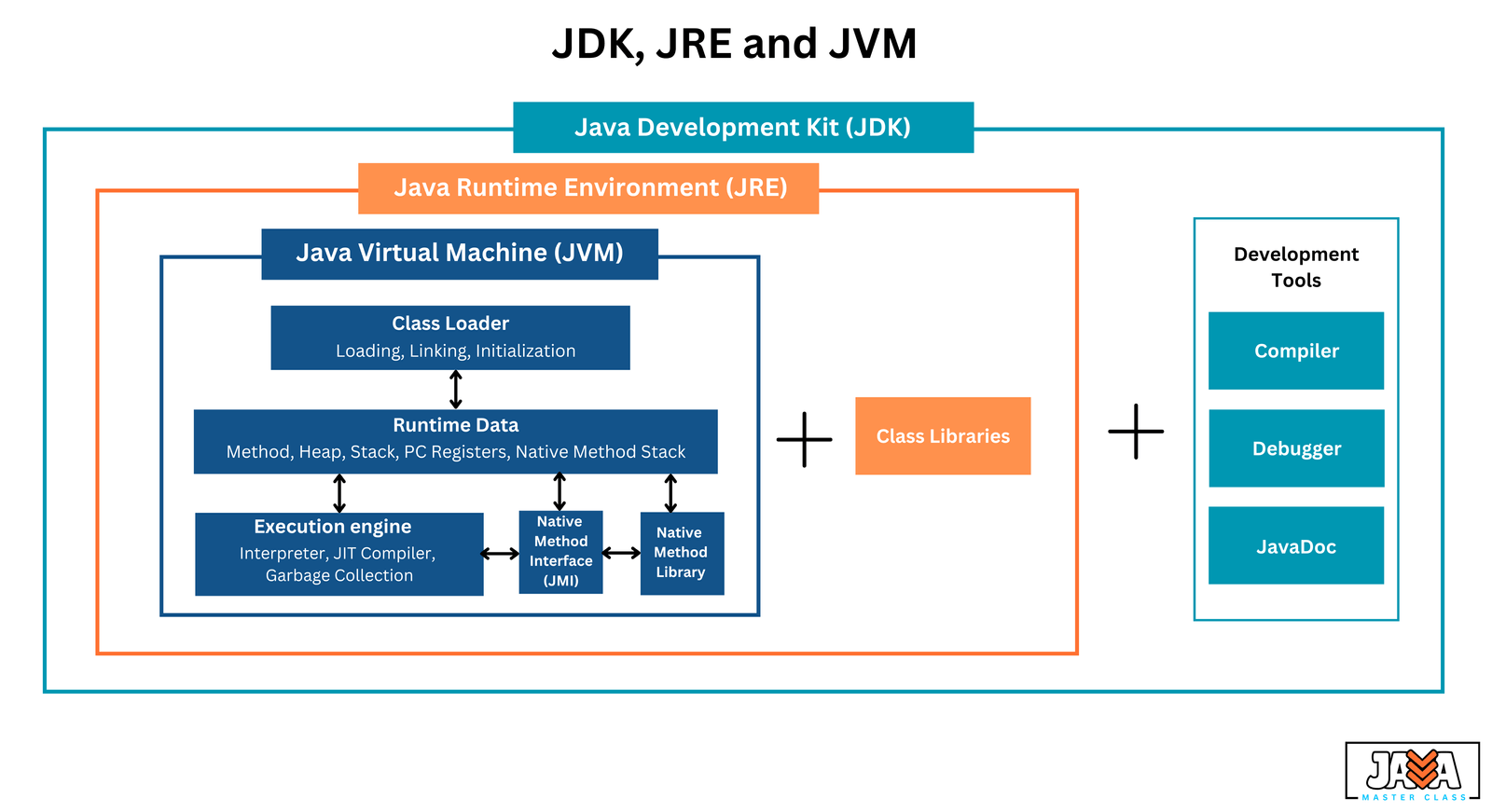JDK
JDK (Java Development Kit) is a software development kit used for developing Java applications. It includes a set of tools, libraries, and utilities necessary for Java development. The JDK provides everything required to create, compile, debug, and run Java applications. It is the foundation for Java developers to build Java programs.
Features of JDK
- Compiler (javac): Converts Java source code into bytecode (.class files).
- Java Runtime Environment (JRE): Included in the JDK, the JRE provides the necessary libraries and resources for running Java applications.
- Java Debugger (jdb): Helps in debugging Java programs.
- JavaDoc: Generates documentation for Java code.
- JVM (Java Virtual Machine): Executes Java bytecode and is included as part of the JRE.
- Libraries and APIs: A wide range of built-in libraries and APIs for file I/O, networking, data structures, and more.
- JAR (Java Archive): Packaging tool to bundle Java classes into a single archive.
- Other Development Tools: Various tools for managing packages, creating documentation, and running tests.
JRE
JRE (Java Runtime Environment) is a part of the Java Development Kit (JDK) that provides the necessary environment for running Java applications. The JRE includes the Java Virtual Machine (JVM), core libraries, and other components required for executing Java programs but does not contain development tools like a compiler.
Features of JRE
- Java Virtual Machine (JVM): Executes Java bytecode on the machine, making Java platform-independent.
- Core Libraries: Essential libraries such as java.lang, java.util, java.io, etc., that provide functionality for common tasks.
- Java Plug-in: Enables running Java applications on web browsers.
- Native Libraries: Provides access to native methods and functions for OS-specific tasks.
- Garbage Collection: Automatically manages memory by reclaiming unused memory, improving efficiency.
JVM
JVM (Java Virtual Machine) is a virtual machine that runs Java bytecode. The JVM is the cornerstone of the Java programming model, enabling Java applications to run on any platform without modification, following the “Write Once, Run Anywhere” (WORA) principle.
Features of JVM
- Platform Independence: JVM allows Java programs to run on any device or operating system that has a JVM installed.
- Memory Management: JVM handles memory allocation and garbage collection automatically, helping developers avoid memory management issues.
- Execution of Bytecode: JVM interprets Java bytecode and translates it into machine code that can be executed by the hardware.
- Security: Provides a secure execution environment by preventing unauthorized code from accessing critical resources.
- Optimizations: JVM has built-in performance enhancements such as Just-in-Time (JIT) compilation to improve the performance of Java applications.
- Multithreading: Supports the execution of multiple threads simultaneously, enabling the development of concurrent applications.

Differences between JDK, JRE, and JVM
| Feature | JDK (Java Development Kit) | JRE (Java Runtime Environment) | JVM (Java Virtual Machine) |
|---|---|---|---|
| Purpose | Full development kit for Java apps (includes JRE) | Provides the runtime environment for Java apps | Executes Java bytecode |
| Includes | Compiler, debugger, JRE, and development tools | JVM, core libraries, and other runtime components | Executes bytecode and manages memory |
| Usage | Used by developers to create Java applications | Used by end-users to run Java applications | Runs bytecode and provides a platform-independent execution environment |
| Tools | Includes tools like javac, javadoc, jdb, and more | No development tools | No development tools |
| Components | JDK includes JRE, which includes JVM | JRE includes JVM | The JVM is responsible for executing the bytecode |
| Target Audience | Java developers | End-users running Java programs | All Java applications are run on JVM |
- JDK is used for developing Java applications and includes everything from the compiler to the runtime.
- JRE is for running Java applications and includes the JVM and core libraries.
- JVM is the engine that executes the bytecode and is a part of both JRE and JDK.
Each component plays an essential role in the Java ecosystem, ensuring that developers can write applications and users can run them on various platforms.
